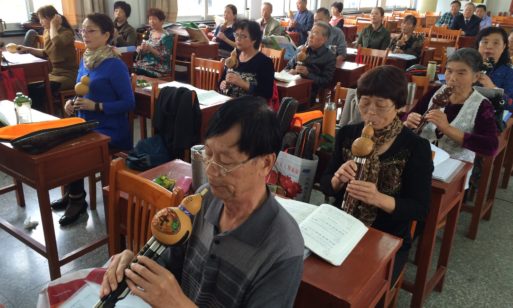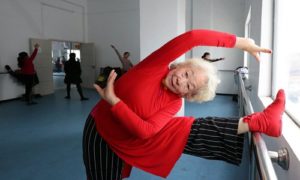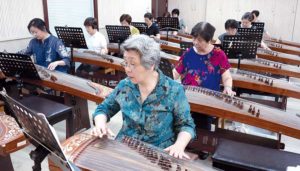
Elderly students learning to play a traditional Chinese flute
Credit: theguardian.com
The old adage “it’s never too late” certainly rings true for many older citizens in China. Senior people in the east Asian nation can now learn new skills at elderly colleges, educational institutions geared towards its older population.
Courses range in subject matter from artistic skills to more traditional university classes. Many involve physical motion. Happy Seniors University in the Hunan Province, for example, offers classes in ballroom dancing and yoga. Dezhou College for the Aged in the Shandong Province offers folk dance and catwalking classes, among others.
Some courses at elderly colleges are meant to teach students about new technology. For instance, Happy Seniors University offers numerous smartphone courses. Seniors can learn how to text, download new apps, shop online, take photos and selfies, etc.
“We found that many old people have the most advanced iPhones but only know how to make phone calls,” said Xin Yu, a teacher at Happy Seniors. “They can’t even send messages or take photos that are not blurry.”
Rapidly Aging Population
The senior populace in China (and around the world) is quickly rising. There were 241 million people aged 60 and older in China in 2017. That number is expected to climb to 487 million by 2050, which will be one-third of the total population. As such, new methods to keep senior citizens engaged and active have evolved over the years.

Credit: globaltimes.cn
Liu Wenzhi, a student at the Dezhou school, has spoken about the importance of and influence that the elderly colleges have had on herself and fellow seniors.
“Outside of work, people of my generation do not have hobbies,” said Liu in a story from Xinhuanet.com. “Our lives after retirement mainly focus on looking after grandchildren. The universities for the aged have changed everything … My life is busy but very rewarding.”
China has over 60,000 education centers for the elderly, according to the China Association of Universities for the Aged. The country has come up with a development plan to increase that number by the end of 2020. The arrangement calls for every city to have at least one “university” for seniors. Fifty percent of towns and 30 percent of villages are required to have schools or learning centers for the elderly by the end of the decade.
Many older people in China look after their grandchildren when their adult children are at work. Courses at the elderly colleges, therefore, are held at times that are convenient for care-giving seniors. Classes at the Dezhou College, for instance, are held between 8:30 to 10:30 in the morning and 2:30 to 4:30 in the afternoon.
“Picking up grandchildren will not be affected,” said the college’s deputy head Liu Wei, according to the Xinhuanet.com story.
Interest in Elderly Colleges a Good Sign
The increased prevalence of education centers for the elderly in China is a result of societal advances in general. Seniors are healthier and more educated than ever, thanks to medical advances and overarching prosperity in the aging Chinese population.

Credit: chinadaily.com.cn
The elderly colleges not only offer seniors a chance to learn something new: They also present an opportunity for older people to remain social and feel like contributing members of society.
“The aim of elderly people is not only to learn,” said Wang Zhifang, head of continuing education school at Shandong Provincial Institute of Education Sciences. “Through continuing study and upgrading knowledge in these schools, they will be better integrated into society and their sense of belonging will be boosted.”
The surge in popularity has some drawbacks, however. Namely, the increased interest has actually been overwhelming for many institutions. Prospective students have had to form lines for registration overnight, with some schools even using a lottery system to choose its students.
Will the United States Follow?
It will be interesting to see if this idea ever becomes popular in Western countries like the United States or Canada.
After some preliminary research, it seems that many universities have so-called “encore programs” for seniors that want to learn new skills. Some offer credit, but many times these classes will be for audit-only purposes.
The main difference between China and the United States is that in the United States most of these courses are offered through major universities. There aren’t any institutions specifically for older citizens. And many times these classes will be offered online, which defeats some of the purpose for senior students who want to be more involved in the community.
The elderly college system in China appears to be very popular and is a great way to bolster seniors’ quality of life. It definitely wouldn’t hurt for state governments or private institutions to think about elderly colleges in the United States.

 China’s Elderly Colleges
China’s Elderly Colleges



 How to Comfort A Dying Loved One
How to Comfort A Dying Loved One
 Our Annual Seven Holiday Gifts for Someone Who Is Grieving, 2024 Edition
Our Annual Seven Holiday Gifts for Someone Who Is Grieving, 2024 Edition














